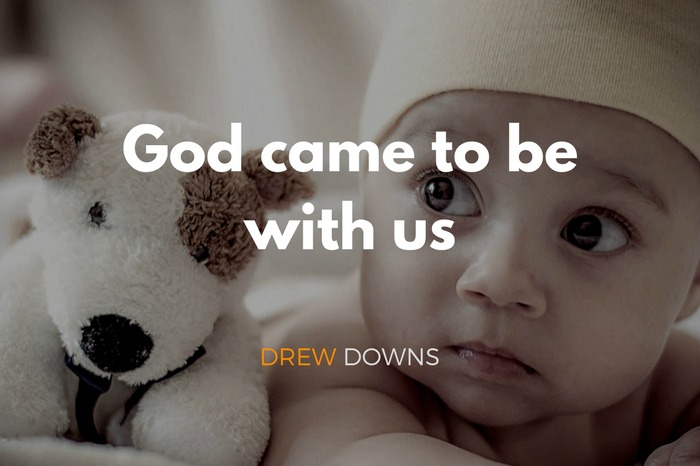3. For in Jesus, taking a human form and raised from the fragility of birth, God came to be with us.
The most profound example of “With” is that God chose to be with us in the form of Jesus.
This is the greatest proof that one’s being with another is the central act of one with faith. It was, after all, a faithful God who kept with a people who didn’t deserve it. And it was a faithful God who chose to make the relationship more intense and intimate in Jesus.
Of course, there are a million different ways God could be with us. And I would argue an infinite number of ways God was and always is with us. But God chose this particular way to express love for us.
Birth
When I held my daughter for the first time, I saw God there. In my arms. And in the bed beside me in her mother. I saw God in the three midwives in the next room knitting hats and in our parents waiting outside for news. Just waiting quietly.
They waited like we waited to meet her.
And I knew, past all the fears about my ability to love and how incompetent I was with children, what the birth of love feels like.
I knew what God feels in the act of creation, in the co-creating wonders of all that was not and now is. And I know the rising flood of emotion and warmth which comes with that baby in that moment.
A love created and made in the flesh. The love two people have together as the engine and behold! Love incarnate! Love loved and adored!
The smallest seed
And I stared at those fragile arms and the tiny body and she stared back. She bore hot streams through my skin and down to my soul. Those wide eyes. She was powerless and contained such power over me. Instantaneously created, like all of human history, Magna Carta and the Constitution, all composed in an instant and I knew my part in this scheme.
She’d be in control.
The juxtaposed truth of the fragility of childhood and how much we could do to screw her up was evident in an instant and ran through my body like a current.
She was ours and we were hers. Always and forever.
This Way, This Fragility
Of the limitless ways, God chose this one. To experience what we experience. Living like we live. Dying like we die.
But it isn’t just the human condition in abstraction, it is the fact of the weirdness of the human condition which makes the with so essential.
Humans have a really, really long time of complete helplessness. Many parents will attest that this sense of helplessness seems to extend long past infancy. Some of us have been known to experience helplessness into late adulthood.
In animal terms, this is absurd. And dangerous.
Carrying a child to term for 9 months and then several years of constant holding and feeding, turn to aiding and then protecting. From the genesis of life to the time a child can pretty much handle themselves in a situation is no fewer than 7 or 8 years.
But even among the particularity of mammalian birth, this is extraordinary. Some can walk within minutes, and many are figuratively out of the house while we’re still counting in weeks.
This particularity is profound enough.
To suggest that God took this route to be with us is revolutionary.
Especially in light of that knowledge and how much smarter it would be for God to take a short cut.
God could’ve taken over the body of some amazing warrior at the height of his prowess or used the life of a wise mystic to teach the world! But to take the act of being born as an expression of love for us? That Mary and Joseph held their baby boy like I did in that birth center! To stare into his eyes and have those sleepy eyes burn down to their souls. That is God’s love.
It is shocking we give so little attention to our mighty, fragility of God.
With us
This fragility, the work, the becoming of Jesus is not only an expression of love. It’s solidarity. God learns and grows and becomes. God accepts and takes on all that we are as humans in precisely the way humans disqualify our ideas of power.
Our Gods can’t be with us because the mighty are above us.
They cannot know weakness because they must be strong.
We must be empowered by them rather than enweakened.
There is nothing about the upside down order of God’s coming to be with us that makes any sense from the top-down hierarchical view. No king would ever hang with his subjects.
Well, almost no king. No king that isn’t inspired to be like God. A God seeking blessing as a king who would serve. A messiah who would die in an act of divine liberation.
This is the act which gives rise to our faith. And it is the ultimate expression of how we come to see our faith. A love so profound, a sacrifice so unimaginable, and an opportunity so humble, that we begin all that we are in faith in dependence.
We must realize how dependent we must be: how we must be with another, be it parent, lover, God. The true expression of profound love is to be with, fragilely vulnerable and utterly dependent.
[This is Thesis #3 of my 31 Theses. To read them all, visit the 31 Theses introduction page.]

